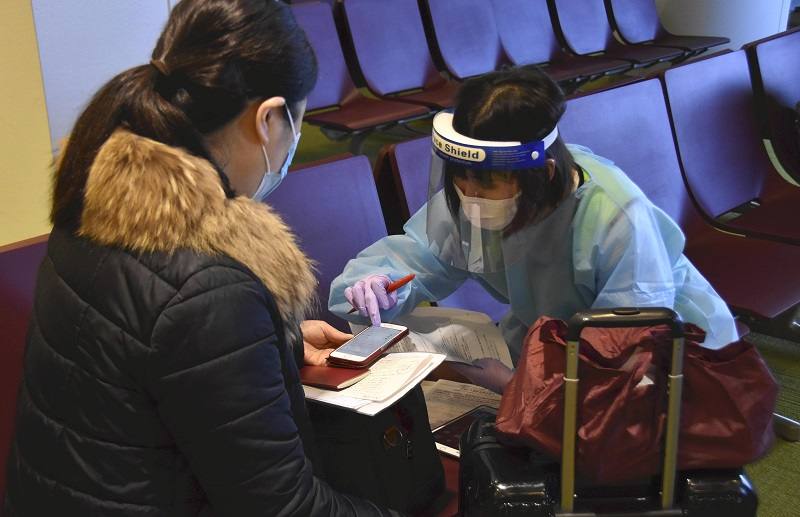
A staff member from a private company checks if a person entering the country at Narita Airport has installed the required apps.
15:32 JST, March 28, 2021
Since the middle of this month, the health ministry has been confirming health conditions and locations of all people who enter Japan through smartphone apps as part of border controls to cope with variants of the novel coronavirus.
Everyone who enters the country is asked to quarantine for 14 days at home or a designated facility. Each person is contacted via video calls through an app once a day and another app also tracks the person’s location.
The Health, Labor and Welfare Ministry has commissioned the apps’ operations to private companies to reduce the burden on public health centers.
Staff from private companies were seen in protective suits at Terminal 1 of Narita Airport in Chiba Prefecture on March 23. The staff confirmed whether people entering the nation had installed the four apps on their smartphone for the video calls, location information and other functions.
A woman in her 50s who returned to Japan from Britain to take care of her ill mother said, “Though I feel reluctant to have my location tracked, I have to accept it if it is for preventing infections from spreading.”
The government announced on March 5 that it was strengthening border controls mainly to prevent variants of the virus from spreading in the nation.
All people entering the nation are required to install the apps and sign documents swearing that they will stay in the places they say they will.
If people violate the rules, the government will disclose their names. For foreign residents, their resident status will also be revoked.
The app installation started with those entering via Haneda Airport in Tokyo and Narita Airports on March 18. From March 26, Kansai International Airport and other locations across the nation started employing the same system.
The toughened measures have been put in place because a remarkable number of people have disobeyed the requests to stay in specific places for self-quarantine.
Earlier this month, it was found that two people who entered the nation from the Philippines via Narita Airport moved from a quarantine location in Chiba Prefecture to their home in Gifu Prefecture without notifying authorities.
Though the two tested negative during inspections at the airport, they were found to have been infected with a variant of the virus when they were in Gifu Prefecture. By then, they had transmitted the virus to at least two other people.
Before the toughened response, public health centers in municipalities where points of entry are located took charge of observing the health conditions of the people who entered the nation. But in the case of Gifu Prefecture, the authorities lost contact with the two people.
In other cases, people had refused to report to public health centers, saying that they did not want to pay communication fees for calls or other methods of contact, and these centers lost contacts with some foreign residents because of language barriers.
With public health centers busy handling the local responses to the novel coronavirus, the ministry decided to reduce their burden with the creation of a center for confirming the health conditions of people entering the country. The center was established this month to offer medical assistance and other aid to foreign visitors to Japan and others, with the actual operations outsourced to private companies.
For example, these private companies have English-speaking staff who talk to the quarantining people once a day via video calls through an app and ask the these people to report their location via another app. If the staff are unable to contact a person more than once, private security personnel patrol places where the person is supposed to be quarantining.
For 14 days through March 13, about 28,000 people entered Japan, with about 12,000 of them foreign nationals.
“By utilizing the private sector, we hope to reduce the burden on public health centers and enhance the surveillance of virus variants,” a ministry official said.
Top Articles in Politics
-

Japan PM Takaichi’s Cabinet Resigns en Masse
-

Sanae Takaichi Elected Prime Minister of Japan; Keeps All Cabinet Appointees from Previous Term
-

Japan’s Govt to Submit Road Map for Growth Strategy in March, PM Takaichi to Announce in Upcoming Policy Speech
-

LDP Wins Historic Landslide Victory
-

LDP Wins Landslide Victory, Secures Single-party Majority; Ruling Coalition with JIP Poised to Secure Over 300 seats (UPDATE 1)
JN ACCESS RANKING
-

Japan PM Takaichi’s Cabinet Resigns en Masse
-

Japan Institute to Use Domestic Commercial Optical Lattice Clock to Set Japan Standard Time
-

Israeli Ambassador to Japan Speaks about Japan’s Role in the Reconstruction of Gaza
-

Man Infected with Measles Reportedly Dined at Restaurant in Tokyo Station
-

Videos Plagiarized, Reposted with False Subtitles Claiming ‘Ryukyu Belongs to China’; Anti-China False Information Also Posted in Japan























